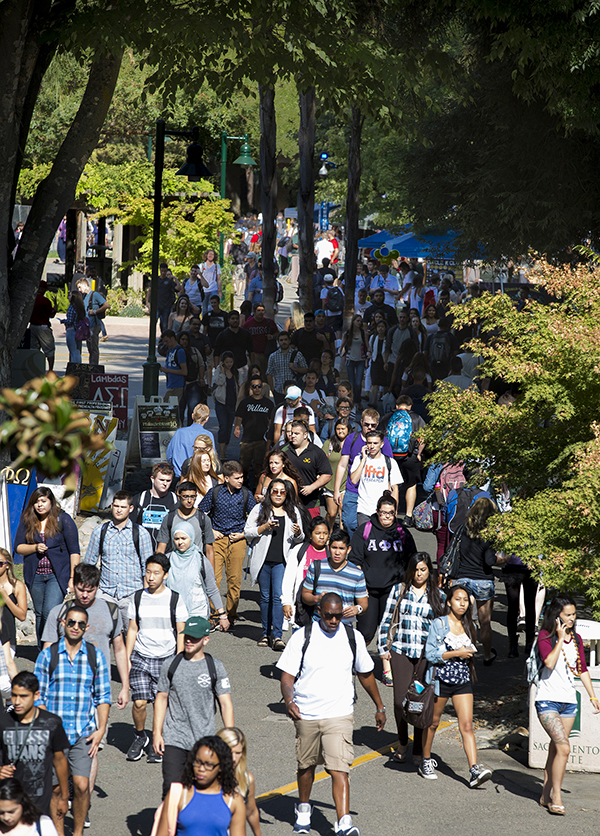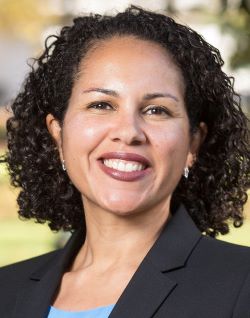 Students from varied backgrounds create a diverse campus community that has the opportunity to embrace a culture of inclusion. (Sacramento State/Jessica Vernone)
Students from varied backgrounds create a diverse campus community that has the opportunity to embrace a culture of inclusion. (Sacramento State/Jessica Vernone)Results of a recent campus climate survey paint an overall picture of Sacramento State as a good and respectful place to work.
That doesn't mean the University can't do better. Data collected from specific groups of respondents underscores opportunities for significant improvement to ensure all members of the campus community feel welcome.
The survey, sent in February 2018 to administrators, staff, tenure-track and non-tenure-track faculty, included questions related to employees’ experiences while working at Sacramento State, their opinions about the University, and specific inquiries related to demographics.
University President Robert S. Nelsen wants the process to continue.
“I encourage all members of our campus community to review the results of the survey and provide feedback on how we can make our campus more inclusive and welcoming,” Nelsen said.
“All feedback will be reviewed by campus leadership and will be used to develop a campus accountability plan to be used for implementing actions to address areas of improvement identified by the survey results and the campus community.”
Leading the initiative is Diana Tate Vermeire, the University diversity officer and executive director of the Office of Inclusive Excellence. The OEI's mission is to create an environment where diverse populations of students, faculty, and staff are represented, and where those voices and authentic perspectives are heard, valued and leveraged.
Vermeire, on the job little more than a year, acknowledges that the work surrounding diversity and inclusion is ongoing and involves group efforts. "It is, in fact, an institutional function,” she said.
“Diversity is oftentimes thought of as numerical representation. Do we have the numbers? Do we have women? People of color?" Vermeire said. "Now we are looking at identity markers which may or may not be visible, such as sexual orientation, gender identity, ability, mental health issues, status as a veteran.
 Diana Tate Vermeire says that furthering equity, diversity and inclusion is a "basic University expectation." (Sacramento State/Andrea Price)
Diana Tate Vermeire says that furthering equity, diversity and inclusion is a "basic University expectation." (Sacramento State/Andrea Price)“The next evolution of the work is beyond simply who is there, but how they get to participate. And that’s how I would describe inclusion.”
Inclusive workplaces and communities boast significant benefits: innovation, forward-looking thinking, mutual respect, empathy and belonging. All are important to members of the newly seated Sacramento State Diversity Council, established by Nelsen and chaired by Vermeire.
The 25-member panel represents a cross-section of the campus community, including appointed and nominated administrators, faculty, staff and students who meet monthly to advise, make recommendations and offer support in the quest to further "inclusive excellence” on campus.
Vermeire said key factors are at play, such as student recruitment, retention, the environment created with people who are here, and decisions about spending and resource allocation. "All of that sends a message and either has an equity impact or one that is devoid of it."
A top priority that emerged for OEI is ensuring that the University recruits faculty, staff and administration more representative of Sac state's students and community.
The study showed that among faculty who reported their ethnic background, 31 percent who were hired in 2016 were people of color; that number has since dropped to 29 percent.
Latest numbers for staff also indicate room for improvement with just 7 percent identifying as African-American, 17 percent as Asian-American, and 23 percent Latinx. Those numbers must rise if they are to more closely resemble makeup of the student population.
A recent grant from the Chancellor’s Office is helping provide tools and resources needed to improve those numbers and implement best recruitment practices.
“We have used the grant to engage faculty fellows who have done a tremendous amount of work around best practices with respect to diversifying faculty,” Vermeire said. “If you want to recruit well, what we’re talking about is broad-based outreach and targeted outreach to ensure a diverse pool.”
Sac State should tout its commitment to equity, diversity and inclusion, Vermeire said, because it's a reality and a "lived value," and also because it should be recognized as a basic University expectation.
Ultimately, Vermeire said, inclusion is about daily interactions with the five or so people we each see most frequently.
“In that more intimate space that the majority of our interactions occur, that space has to feel inclusive," she said. "That’s where the real work exists.”
The campus community is asked to provide feedback on the campus climate survey results and is invited to participate in a forum scheduled for noon-1 p.m. Thursday, April 4, 2019, in the Hinde Auditorium at the University Union. – Anita Fitzhugh
